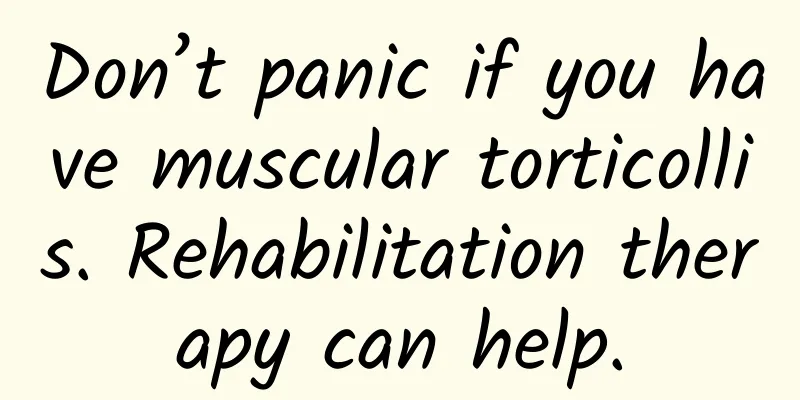Don’t panic if you have muscular torticollis. Rehabilitation therapy can help.

|
In life, mothers often say, "When my baby is held upright, his head always tilts to one side, and there is a lump on his neck. I don't know what's going on." Many parents think it's just a habit, and even think it's cute to tilt the head. Little do they know that if the baby likes to tilt his neck, he may be suffering from "congenital muscular torticollis"! Congenital muscular torticollis is a common disease caused by sternocleidomastoid muscle contracture. Children often show symptoms such as head tilt to the affected side, mandibular rotation to the healthy side, facial asymmetry, sternocleidomastoid muscle contracture, and masses in the neck. Early diagnosis and treatment can help improve the prognosis. If not treated in time, it can lead to secondary deformities such as limited neck movement, facial asymmetry, vertebral narrowing, and scoliosis. The disease is mainly treated with rehabilitation, including massage, hot compress, posture correction, botulinum toxin injection, surgical treatment, etc., but early rehabilitation treatment is mainly based on massage. Here are some massage techniques: 1. Thumb or middle finger kneading method: The child lies on his back, applies a small amount of talcum powder or massage oil on the sternocleidomastoid muscle on the affected side, and uses the middle finger or thumb to massage the entire sternocleidomastoid muscle and the surrounding area to relax the tendons and blood circulation and relax the local muscles. 2. Plucking method: Use the thumb and index finger to pinch and pluck the affected side sternocleidomastoid muscle 10-20 times to loosen its adhesion. 3. Press and rub the lump: Apply massage oil on the affected side, and gently rub the lump with the thumb or middle finger for 5-10 minutes to disperse blood stasis and reduce swelling. The above three massage techniques can be completed by parents at home. Each massage lasts 20-30 minutes. After the massage, local hot compress can be applied for better therapeutic effect. Hot compress is recommended 3 times a day. 4. Lateral traction method: Use one hand to fix the affected shoulder or support the chin, and use the other hand to pull the head toward the healthy side until the ear of the healthy side is against the healthy shoulder, usually 15 to 45 degrees beyond the midline, and hold for a few seconds, repeated several times. 5. Rotational traction method: Use one hand to fix the healthy shoulder, and use the other hand to rotate the head toward the healthy side, and hold for a few seconds. Usually, the chin should be close to the middle of the clavicle on the healthy side, and repeat several times. Lateral traction and rotational traction are often used by rehabilitation therapists in hospitals or rehabilitation institutions. There are certain risks when parents use this technique, so it is recommended that they choose it with caution or perform it under the guidance of a doctor. Finally, if your child has symptoms of muscular torticollis such as a crooked neck or a neck lump, go to the hospital's pediatric rehabilitation department as soon as possible to get a clear diagnosis and receive comprehensive rehabilitation treatment such as massage at an early stage to enhance efficacy and improve prognosis. |
>>: Will long-term contact lens wearing cause ptosis?
Recommend
Early pregnancy nutrition
In life, most expectant mothers start to worry ab...
The dangers of getting angry during menstruation
We women all know that psychological and emotiona...
What department is better for itchy nipples?
Itchy nipples are a relatively dangerous symptom,...
Treatment of adult granulosa cell tumor of the ovary
In recent years, the incidence of gynecological d...
What to do if your labia is dry
What to do about dry labia is a disease that many...
In the face of the new coronavirus, why must we insist on dynamic zero-COVID?
Recently, the famous journal Nature Medicine publ...
What does a weak positive ovulation test on the ninth day of ovulation mean?
I believe that many women who are preparing for p...
Is green vaginal discharge a sign of pregnancy?
Women will have some leucorrhea more or less. The...
Did you know? These vitamins can boost your immune system
Knowing which vitamins can boost the immune syste...
Can the Internet celebrity dry hair spray be used? Is it harmful to the human body? Frontline experts come to answer
Image source: Tuchong Creative Recently, there ar...
Can I eat green mango during menstruation?
The nutritional value of green mango is very high...
Human head nipple 39 high risk TCT mild inflammation
Medicine is constantly developing, but there are ...
What causes kidney pain in girls?
Kidney pain in girls may be caused by symptoms of...
Is it good to eat sea cucumber when preparing for pregnancy?
As we all know, nutrition and diet are very impor...









